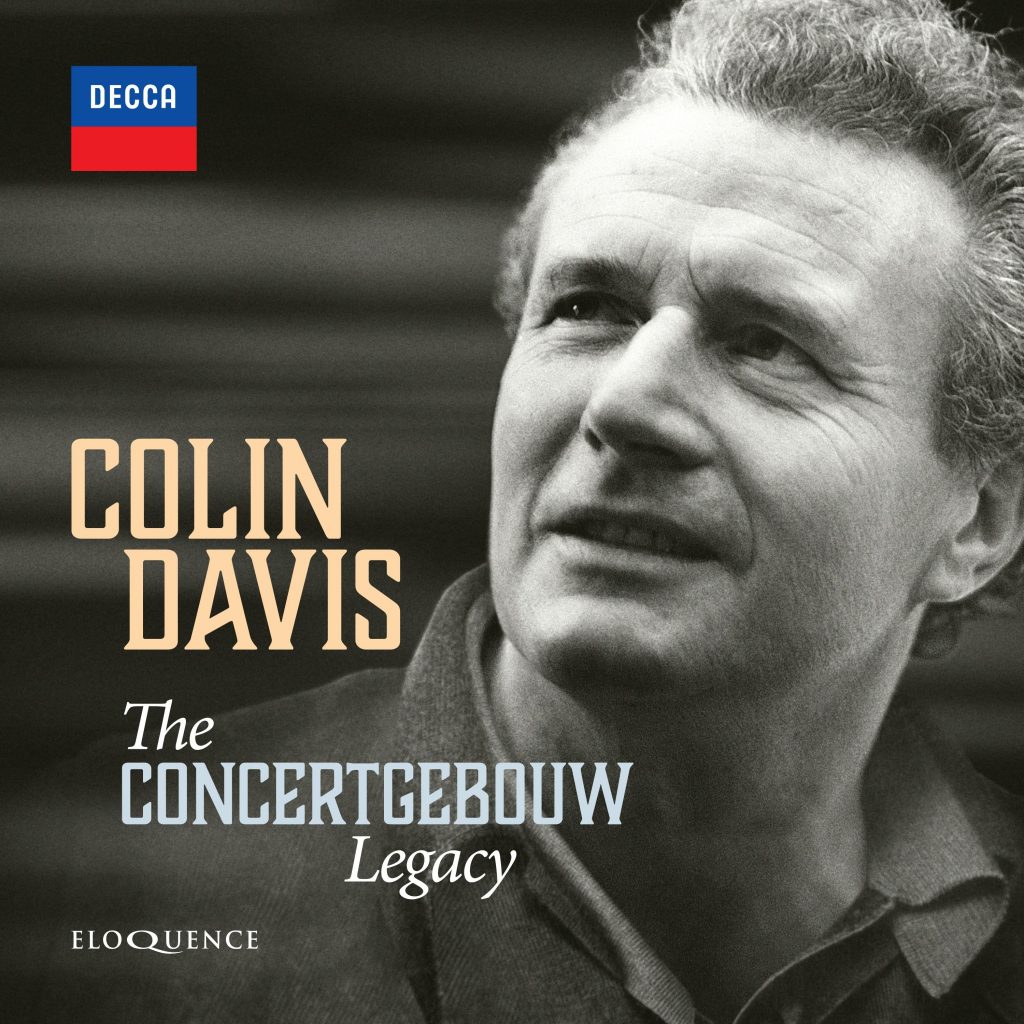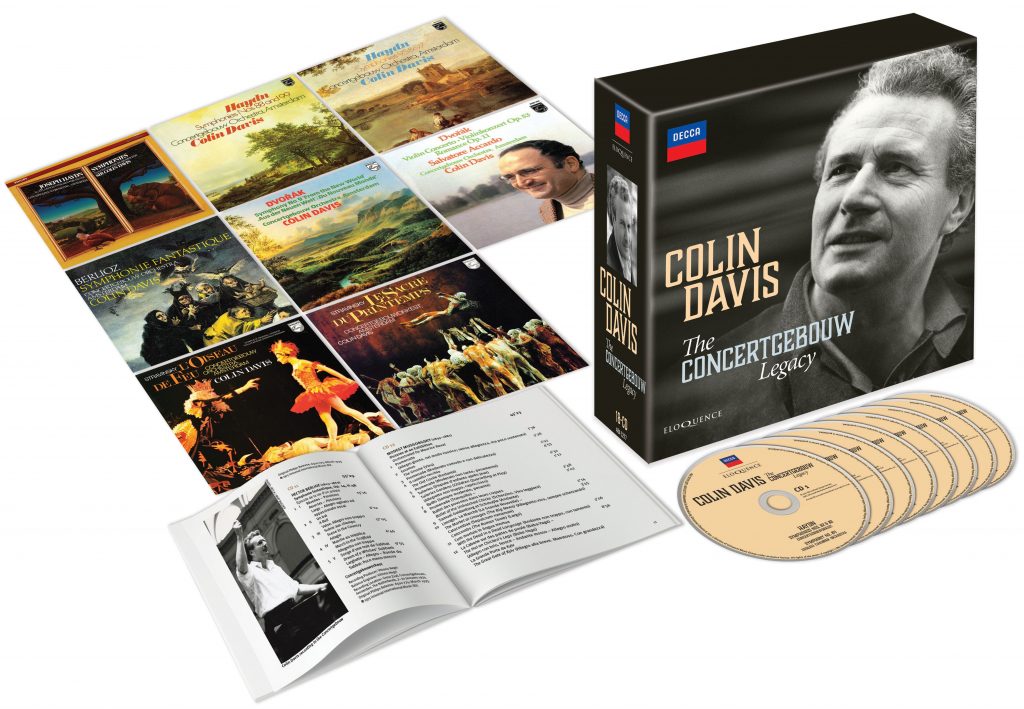


Colin Davis made his debut with the Concertgebouw in 1966, and conductor and orchestra quickly established a mutual affinity. Interviewed by Niek Nelissen for a new appreciation of their legacy on record, a Concertgebouw violinist recalls his ‘typically British’ humour in rehearsal. Davis gave the musicians of ‘the orchestra a lot of freedom. He kept control in a good way, which made him popular with the orchestra.’
It took another eight years for Davis and the Concertgebouw to make their first records together, but they made up for lost time. The albums of Beethoven’s Violin Concerto (with Arthur Grumiaux) and the Symphonie fantastique of Berlioz were universally praised for their rhythmic impetus, and for the kind of unassuming authority that became a hallmark of Davis’s conducting. In both cases, the new recordings superseded earlier versions by the same artists (Davis’s LSO Berlioz, and Grumiaux’s previous Beethovens with the Concertgebouw) not least because of the warmth and the transparency of the Philips recordings, made in the orchestra’s acoustically optimal home.
There followed, over the next eight years, a string of artistic and commercial successes. The Concertgebouw had not recorded much Haydn before, but Davis harnessed their richness of tone and supple responses, and trained it on Haydn’s late symphonies with revelatory results. Even while period-instrument performers began to bring new perspectives to Haydn, Davis’s lively sympathy showed itself in the buoyant rhythms, the cultivated eighteenth-century phrasing and the exuberance which always belongs to his symphonies. Together, they recorded the complete ‘London’ symphonies followed by the ‘Paris’, and this set also features a bonus of No. 84, which Davis recorded with the English Chamber Orchestra for L’Oiseau-Lyre in 1960. This is the first time all of Davis’s Haydn symphony recordings with the Concertgebouworkest have been issued collectively.
Equally acclaimed was a Dvořák series featuring the last three symphonies, the concertos for violin and cello (with Salvatore Accardo and Heinrich Schiff) and the Symphonic Variations. Throughout his long career, Davis took particular pleasure in bringing out the nostalgic side as well as the Czech-accented rhythms of Dvořák’s music, just as his approach to Igor Stravinsky never lost its cutting edge, as displayed here in Concertgebouw recordings of the three early Diaghilev ballets.
While these recordings have rarely left the catalogue thanks to their popularity, hearing them together sheds new light on the remarkable idiomatic strength of the Concertgebouw/Davis partnership. Original couplings and covers have the ring of nostalgic authenticity, complemented by Niek Nelissen’s new essay and many archive photographs of conductor and orchestra.
CD 1
HAYDN Symphonies Nos. 82°, 83° & 84*
*English Chamber Orchestra
°Concertgebouworkest / Colin Davis
CD 2
HAYDN Symphonies Nos. 86 & 98
Concertgebouworkest / Colin Davis
CD 3
HAYDN Symphonies Nos. 103 & 87
Concertgebouworkest / Colin Davis
CD 4
HAYDN Symphonies Nos. 88 & 99
Concertgebouworkest / Colin Davis
CD 5
HAYDN Symphonies Nos. 92 & 91
Concertgebouworkest / Colin Davis
CD 6
HAYDN Symphonies Nos. 93, 94, 96
Concertgebouworkest / Colin Davis
CD 7
HAYDN Symphonies Nos. 95 & 97
Concertgebouworkest / Colin Davis
CD 8
HAYDN Symphonies Nos. 100 & 104
Concertgebouworkest / Colin Davis
CD 9
HAYDN Symphonies Nos. 101 & 102
Concertgebouworkest / Colin Davis
CD 10
BEETHOVEN Violin Concerto
Arthur Grumiaux; Concertgebouworkest / Colin Davis
CD 11
BERLIOZ Symphonie fantastique
Concertgebouworkest / Colin Davis
CD 12
MUSSORGSKY Pictures at an Exhibition; Night on Bald Mountain
Concertgebouworkest / Colin Davis
CD 13
DVOŘÁK Symphonies Nos. 7 & 8
Concertgebouworkest / Colin Davis
CD 14
DVOŘÁK Symphony No. 9
Concertgebouworkest / Colin Davis
CD 15
DVOŘÁK Violin Concerto; Romance
Salvatore Accardo; Concertgebouworkest / Colin Davis
CD 16
DVOŘÁK Cello Concerto; Silent Woods
Heinrich Schiff; Concertgebouworkest / Colin Davis
CD 17
STRAVINSKY L’Oiseau de feu
Concertgebouworkest / Colin Davis
CD 18
STRAVINSKY Le Sacre du printemps; Petrouchka
Concertgebouworkest / Colin Davis
“I would have to include Sir Colin Davis’s splendid recording … among my Desert Island Discs: it is a source of endless pleasure.” Gramophone, January 1986 (Haydn: ‘London’ Symphonies)
“This is a splendid set, conducted with penetrating insight, full of character, magnificently played and beautifully recorded.” Gramophone, June 1982 (Haydn: ‘London’ Symphonies)
“There is no trace of routine in this music-making and no failure of imagination… its blend of brilliance and sensitivity, wit and humanity gives [this Haydn series] a special claim.” Penguin Guide (Haydn: ‘London’ Symphonies)
“With their bracing rhythmic flow and natural feeling for Dvořákian lyricism, [Nos. 7 & 8] are appealingly direct yet have plenty of life and urgency.” Penguin Guide (Dvořák)
“All the distinctive features of the [LSO] recording are preserved and even improved upon … No other Fantastique conductor on records executes the score so scrupulously.” High Fidelity, May 1975 (Berlioz: Symphonie fantastique)
“No small factor in the overall effectiveness of the new Davis reading are the superb playing … and the resplendent sonics.” Stereo Review, July 1975 (Berlioz: Symphonie fantastique)
“Grumiaux and Davis are all aristocratic elegance and enchanting lyricism.” Stereo Review, August 1975 (Beethoven: Violin Concerto)
“The distinctive element of Davis’s reading is the richness of colour and nuance he manages to bring out with the 1947 scoring.” Stereo Review, May 1979 (Stravinsky: Petrushka)
“Davis manages to secure this knife-edge precision and refinement of tone and balance without sacrificing the heft of Dvořák’s scoring, thanks no doubt to the superbly vigorous, dark-toned playing of the Concertgebouw.” High Fidelity, April 1977 (Dvořák: Symphony No. 7)
“Super-fine ensemble work … a perfect blend of masculinity and refinement in Davis’s conducting.” Stereo Review, January 1978 (Haydn: Symphonies Nos. 88 & 99)
“There is a freshness and authenticity of response that succeeds in exciting the listener as did the very first performances that one recalls.” Gramophone, May 1978 (Stravinsky: Le Sacre du printemps)
“Davis generally heeds the composer’s markings closely and displays control and vital energy in his interpretation.” High Fidelity, June 1979 (Stravinsky: Petrushka)
“The sheer opulence of tone and the effortless virtuosity of the Concertgebouw Orchestra puts this version into a class of its own.” Gramophone, October 1979 (Stravinsky: L’oiseau de feu)
“The quality of the orchestra’s winds is a big plus; so is the conductor’s willingness to bring out oft-forgotten combinations of inner voices. Davis is interested in clarity and gets lovely balances.” High Fidelity, August 1978 (Stravinsky: Le Sacre du printemps)
“Davis’s attention to structure is expressed with typically British sobriety and proportion. There are signs in the Eighth, though, of greater spontaneity, of letting the superb first-stand Concertgebouw players ad lib around the standard script.” High Fidelity, March 1980 (Dvořák: Symphony No. 8)
“A wonderful amalgam of vitality and elegance … expert detail work … the sonics are a joy.” Stereo Review, January 1981 (Haydn: Symphonies Nos. 101 & 102)
“The performance is finely characterised, with the distinguished soloist making the most but never too much of [the concerto’s] rhetoric and poetry.” Gramophone, February 1981 (Dvořák: Violin Concerto, Romance)
“Davis and the Concertgebouw provide superlative backup for Accardo’s adroit and distinguished solo work.” High Fidelity, March 1981 (Dvořák: Violin Concerto)
“Accardo and Davis have the measure of this music, and they function superbly together.” Stereo Review, April 1981 (Dvořák: Violin Concerto)
“Always concerned with detail [Davis] shows how a modern symphony orchestra with a lush sound can create highly intelligent musical results [in Haydn].” High Fidelity, June 1981 (Haydn: Symphonies Nos. 86, 98, 101 & 102)
“Davis’s approach is exceptionally restrained yet incomparably enchanting and uniquely rich in humour.” High Fidelity, July 1981 (Mussorgsky: Pictures at an Exhibition)
“Thrillingly well played, with exceptionally precise articulation and great momentum.” High Fidelity, January 1982 (Mussorgsky: Night on Bare Mountain)
“Craggy, weighty, and rough-hewn, qualities apparent in both the sonority of the orchestra and the playing of the soloist.” High Fidelity, February 1982 (Dvořák: Cello Concerto)
“Stylishly played and conducted … there is much to enjoy here.” High Fidelity, October 1982 (Haydn: Symphonies Nos. 95 & 97)
“Has either work ever been better played or recorded?… You’re not likely to find any versions of these works more lastingly satisfactory.” High Fidelity, October 1983 (Haydn: Symphonies Nos. 93 & 94)
“Both symphonies are played with tremendous style and a marvellous feeling for tempo and rhythm; they are done, rightly, in the grand symphonic manner, yet the superb playing of the great Dutch orchestra … presents the scores with the fine detail of chamber music.” Gramophone, March 1984 (Haydn: Symphonies Nos. 91 & 92)
“With such style and spring in the rhythms, this is very highly recommended.” Gramophone, April 1985 (Haydn: Symphonies Nos. 91 & 92)
“Among Sir Colin’s finest records … No one could possibly remain doleful in this music.” Gramophone, February 1988 (Haydn: Symphonies Nos. 82 & 83)
“[Dvořák’s Symphony] No. 7 is powerful and noble, an eloquent expression of the work’s brooding majesty … No. 8 receives a radiant performance … that features the Concertgebouw brass on dazzling form in the finale.” High Fidelity, July 1989 (Dvořák: Symphonies Nos. 7 & 8)



